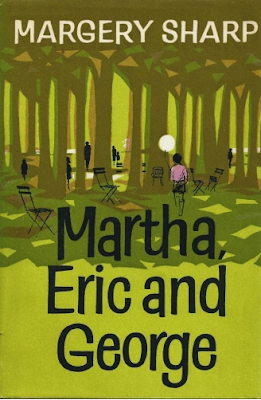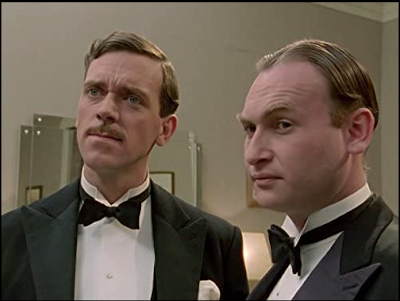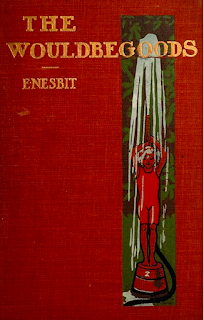
I thought I'd start Paris in July with a short, fun book. Margery Sharp's Martha in Paris fit the bill perfectly -- only 166 pages and it was one more I could cross off my owned-and-unread pile. However, when I bought this at Strand Books several years ago I didn't realize it was second in a series. Naturally I would need to read them in order, so I had to track down the first book and buy that one too, though it's set in London, not Paris.

Published in 1957, The Eye of Love is the first book of the Martha series. Set in 1932, it begins with Martha's aunt, who was christened Dorothy Hogg but now goes by the name of Dolores Diver. Miss Diver, on the wrong side of 30 and fading, has just been left by her longtime lover Mr. Gibson, who is about to become engaged to the daughter of an associate, in order to preserve his failing furrier business. Times are hard and during the Depression, furs aren't selling well. Mr. Gibson and Miss Diver are despondent, but there's nothing to be done. He must leave his Spanish rose to marry an annoying woman he doesn't love. The least he can do is pay the lease on their love-nest through the end of the year, and give her all the contents which they've accumulated.
Miss Diver is also the guardian of her orphaned niece Martha, now ten years old and obsessed with drawing -- so much so that she basically eludes school and spends all her time sketching trees, stoves, and anything that catches her fancy. One day while sketching a tree she meets Mr. Phillips, who is looking for new lodgings, and he becomes their boarder, but soon suspects Miss Diver has some money and decides to make a play for her.
 |
| I love this pulp novel cover - so dramatic! |
Meanwhile, Mr. Gibson has merged his business with the charming and steadfast Mr. Joyce, his future father-in-law, and they soon develop a deep friendship -- much more so than with his future wife Miranda. He cannot bear the thought of marrying her instead of Miss Diver but doesn't see any way around it. Coincidentally, Mr. Joyce, a lover of art, also encountered young Martha while sketching and sees that she has talent. Naturally all the stories converge, and without going into too much detail, I'll only say that it's witty and charming and has a very satisfactory ending.

I really enjoyed it and was also enchanted by the sequel, Martha in Paris. The story has jumped forward and Martha is now eighteen. Mr. Joyce is now Martha's patron and decrees that she MUST study in Paris. Martha is still obsessed with her drawing and resists at first, but then sees the advantages and begins studying art while staying with a widow and her daughter. She's very focused and is oblivious to everything else -- in once instance, she doesn't even realize that while sketching in the Tuileries Gardens, the nice young Englishman named Eric sitting next to her is asking her out on a date. In a very amusing turn of events, she turns his invitation to Friday night dinner with his mother into an opportunity for a really good bath in their renovated English-style tub.
This book is equally witty and charming and surprisingly feminist for its time (first published in 1962). Martha is portrayed as an artist completely focused on her work, but she actually struck me as someone who today might be considered on the autism spectrum. She's completely obsessed with drawing and art, and really bad at picking up at social cues. I'm no expert but if the book were published today I think readers would really speculate about that.
 |
This cover is just SO WRONG it's laughable.
Martha wouldn't be caught dead in stockings and black pumps.
It's so bad I had to include it. |
My one tiny quibble about this book is that if the first book starts in 1932, the second would be set squarely in WWII and the French occupation of Paris. There is not a single mention of this and people are traveling back and forth over the Channel from England,so clearly, this book is set in an alternate universe in which the war never took place (but now I'm nitpicking).
I don't want to give away too many details for fear of spoilers, but Martha in Paris ends on such a cliffhanger I absolutely had to find out what happened next, and I found a online copy of the final novella, Martha, Eric and George online and read the whole thing in a couple of hours. If I gave any but the loosest setup it would absolutely spoil the plot of the second book. The third books picks up immediately after the end of the second, and after a couple of chapters, jumps forward ten years later with Martha as a successful artist who has to finally deal with the fallout of her actions in the end of the second novel. I loved the third novel as well as the first two but I do think it ended rather abruptly.
 |
I love this retro cover.
|
Like the second novel, it's also very feminist for its time (1964). Like Martha, author Margery Sharp was very successful and focused on her work. I also wonder if Martha's devotion to her work was a reflection of Sharp's own feelings about women working. I'm guessing some people will find Martha unsympathetic but if she'd been a man no one would have raised an eyebrow at her absolute dedication to her work and confidence in her talent.
I've now read a dozen of Margery Sharp's books for adults (she also wrote the Rescuers children's series adapted into two animated Disney movies.) I've really enjoyed all of them and I'm happy to report many have been reprinted, including six recent paperback editions by the Furrowed Middlebrow imprint of Dean Street Press. The DSP editions are available on Kindle for around $3 or $4 US, a real bargain, and I'm sure I'll be downloading some of them soon.































